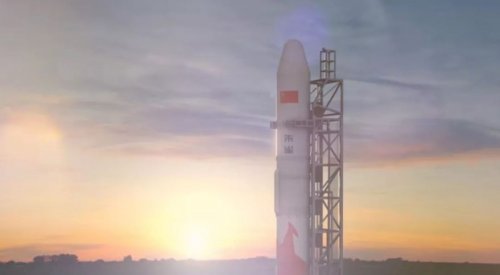Chinese launch provider Landspace raises new funding while satellite firms see successful missions and Galaxy Space set for 5G satellite launch.
HELSINKI — Private Chinese space launch firm Landspace has raised $71 million in series C round funding to be used for the development of a new launch vehicle.
The new round of funding was led by Country Garden Venture Capital. It takes the total raised by Landspace in 2019 to $85 million (600 million yuan).
The new funding will be mainly used for the development of the two-stage Zhuque-2 (Vermillion Bird-2) medium-lift launch vehicle.
The new launcher is powered by liquid methane-liquid oxygen rocket engines. It will measure 48.8 meters tall with a diameter of 3.35 meters. A test flight is scheduled for 2021.
Zhuque-2 will be capable of delivering a 4,000-kilogram payload capacity to a 200-kilometer low Earth orbit and 2,000 kilograms to 500-kilometer Sun-synchronous orbit. The funding will also go towards verification of reusable rocket technology.
Landspace carried out tests of the two methalox engines powering the Zhuque-2 during the summer. A full-system hot fire test of the TQ-11, a 10-ton thrust engine for the Zhuque-2 second stage, was carried out Nov. 30. A successful 100-second test of the larger TQ-12 80-ton thrust engine for the first stage was performed during the summer.
As well as making progress on the launcher, Landspace has been moving forward with securing contracts.
Last week Landspace signed a contract with Spacety, a Changsha-based private satellite firm, for Zhuque-2 launch services. In April Landspace reached agreements with UK-based Open Cosmos and D-Orbit of Italy related to Zhuque-2.
The company earlier this year also secured about $14 million in a series B+ funding round from Shanghai Yi Sheng Investment, Luxin Venture Capital and others.
Emerging Chinese private space firms
Landspace Technology Corporation was founded in 2015, following a 2014 central government policy shift which opened the launch and small satellite sectors to private capital. The Beijing-based firm had previously attracted $75 million in funding from China Growth Capital, Goldwind, PGA Venture Partners and others.
The firm made the first Chinese private attempt to place a satellite in orbit in October 2018 with its three-stage, solid-propellant Zhuque-1 launch vehicle. The mission ended in failure due to a reaction control system anomaly 402 seconds into the flight.
OneSpace failed with its first orbital launch in March, before fellow private competitor iSpace achieved orbit with an historic launch in July.
Beijing Interstellar Glory Space Technology Ltd., also known as iSpace, says it is aiming to test its own methalox rocket, Hyperbola-2, in 2021.
Hyperbola-2 will be capable of lifting 1.1 metric tons to a 500 km Sun synchronous orbit (expendable) or 700 kg reusable. The 28-meter-tall, of 3.35-meter-diameter will have a mass at liftoff of about 90 metric tons.
Chinese commercial launch companies are being supported by a national strategy of civil-military fusion. This includes facilitating the transfer of restricted technologies to approved firms in order to promote innovation in dual-use technology. In the space sector the light-launch and small satellite arenas are seeing particularly intense activity.
Rapid response satellite launches
The civil-military fusion strategy was highlighted over the weekend with the launch of two Kuaizhou-1A rockets from transporter erector launchers at Taiyuan Satellite Launch Center, north China.
The missile-derived Kuaizhou-1A light lift launchers are owned by a spin-off from the state-owned defense contractor CASIC. The two launches put seven satellites into orbit while also proving rapid reaction launch capabilities.
The first launch was dedicated to the Jilin-1 Gaofen-02B high resolution optical remote sensing satellite for Chang Guang Satellite Technology Co. Ltd., an Earth observation satellite maker linked to the Chinese Academy of Sciences.
The second launch carried satellites which saw varying levels of involvement from commercial Chinese satellite companies Spacety, HEAD Aerospace, Guodian Gaoke and ASES Space.
In a new and further development, Galaxy Space, a private satellite communications firm, is expected to see the launch its first satellite, Yinhe-1, as a technology verification test for a 5G constellation.
Launch is expected from Jiuquan as soon as late December, with the intended orbit for the 227-kilogram satellite to be about 1,150 kilometers, according to Beijing Daily. The satellite could use the Q/V band spectrum range. Galaxy Space has stated it is aiming to launch at least 144 satellites to provide global 5G services.
Second wave Chinese private launch firms advance
A second, newer wave of private Chinese space launch firms are following the path of Landspace, iSpace and OneSpace.
Beijing Xinghe Dongli Space Technology Co. Ltd., also known as Galactic Energy, recently took another step toward the maiden launch of its solid propellant ‘Ceres-1’ in 2020. The firm performed a hot fire test of the launcher’s third stage Dec. 3. First and second stage engine tests have previously been carried out.
Beijing Aerospace Propulsion Technology Co. Ltd., a rocket engine maker founded Aug. 2018, recently tested the gas generator for a variable thrust 10-ton methalox engine named Canglong-2. Canglong-1 is a larger 60-ton version.
Meanwhile Beijing Tianbing Technology Co., Ltd., also known as Space Pioneer, continued tests last month of a 30-ton HCP liquid engine, serving to highlight the range of rocket engine development currently ongoing in China’s nascent commercial space sector.
- Chinese iSpace achieves orbit with historic private sector launch
- Landspace assembles methalox engine, signs international agreements
- Landspace fails to reach orbit with milestone private Chinese launch
- Landspace ready for first Chinese private orbital launch but looks to grander plans
- Landspace of China to launch first rocket in Q4 2018
Share with your friends

(0) Comments
This article comments are currently no :(